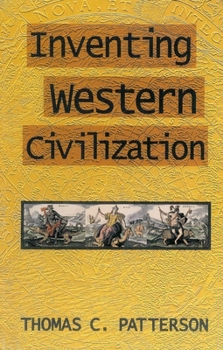Inventing Western Civilization
Select Format
Select Condition 
Book Overview
What is civilization? The term, commonly identified with "uplift" and "order," has come to take on another meaning: the "civilized" versus the "primitive." This book is about the idea of civilization and how, at different times, the concept has been used by the powerful in order to defend their status. Drawing on his extensive knowledge of early societies, anthropologist Thomas C. Patterson shows how class, sexism, and racism have been integral to the appearance of "civilized" societies in Western Europe.
Format:Paperback
Language:English
ISBN:0853459614
ISBN13:9780853459613
Release Date:January 1997
Publisher:Monthly Review Press
Length:156 Pages
Weight:0.49 lbs.
Dimensions:0.5" x 5.5" x 8.2"
Customer Reviews
3 ratings
THIS BOOK MAY SHATTER YOUR PERSPECTIVE!
Published by Thriftbooks.com User , 17 years ago
If you truly believe that Western civilization is the worldwide and most complete civilization, while all others are parochial, then this book may shatter your perspective. In "Inventing Western Civilization," Thomas C. Patterson suggested that "civilized people are obsessed with their uncivilized kin and neighbors--[so] they call them savages, barbarians or the `masses' who lack their polish, refinement, and sophistication; who... have moved en mass into their midst." Patterson develops his argument and explores the idea of civilization in only five short chapters. He examines the constantly changing "social and political conditions in which civilization is produced and deployed." The work questions conventional knowledge about the idea of western civilization created by white, male, elites to preserve and perpetuate their power in society.
Marvelous achievement! Quick, clear, and powerful!
Published by Thriftbooks.com User , 21 years ago
In the short span of 123 pages, Thomas Patterson delivers a stunning and succinct overview of "Western civilization" and its encounters with "savages," different "races," and the Other. He recounts briefly yet movingly the Spanish onslaught of Native Americans, ancient Greek notions of barbarism, the British colonization of Ireland, and more. But Patterson only gives the briefest sketch of these meetings--he is more concerned with the ever-changing ideologies with which some Europeans justify the wholesale looting, enslavement, murder, and colonization of others around the globe. He portrays conservative and liberal ideas, as well as racial and economic notions. He sketches the involvement of science with racism and colonialism, and he brings to life the deeply classist and sexist hatreds of Europeans elites--hatreds which easily translated into colonialism (inferiors and feminine types around the world "needed" to be ruled). Remarkably, Patterson manages to find space for critiques of "civilization," both from within European societies and from those they encountered. In this way agency is not restricted to a few rich, White Europeans, and the dialogue is constant and contested. I assigned this book to my upper division college students, and they comprehended and thrived on this book. It is quick, clear, and powerful--truly a marvelous contribution. I will surely assign it again. Highest recommendation!
this really makes you think
Published by Thriftbooks.com User , 21 years ago
This book was an assigned book in my Introduction to Cultural Anthropology course. Although the premise of the book has nothing to do with the field of cultural anthro, reading it helped me put the notion of "civilization" and such ideas as "culture" and "race" into perspective. Definitely not a book to take to the beach, but a good read for those looking to expand their knowledge of political institutions.






